
Explore construction welder jobs, pay, training, and top tips to launch your skilled trades career. Find your next welding opportunity today!

Construction welder jobs are some of the most in-demand skilled trades positions in North America, with 666 active job postings across Canada alone and wages ranging from $52,000 to $83,200 annually.
Top Construction Welder Job Opportunities:
The skilled trades shortage has created a perfect storm for welders. Quebec leads with 258 openings, Ontario has 226, and Alberta offers 43 positions - many with immediate start dates. Entry-level helpers can earn up to $27.93/hour during shutdown projects, while experienced welders command top dollar plus travel benefits.
Whether you're looking for steady local work or high-paying per diem assignments, the construction welding field offers multiple career paths from apprentice to journeyperson to supervisor. With apprenticeship programs involving three 12-month periods and comprehensive on-the-job training, you'll build skills that travel anywhere.
I'm William "Stick" Mank, a second-generation welder with over 20 years in oil and gas construction, and I've seen how construction welder jobs can build solid careers for those willing to master the craft. Through my experience in extreme conditions and founding Tentacle Tools, I understand what it takes to succeed in this demanding but rewarding field.
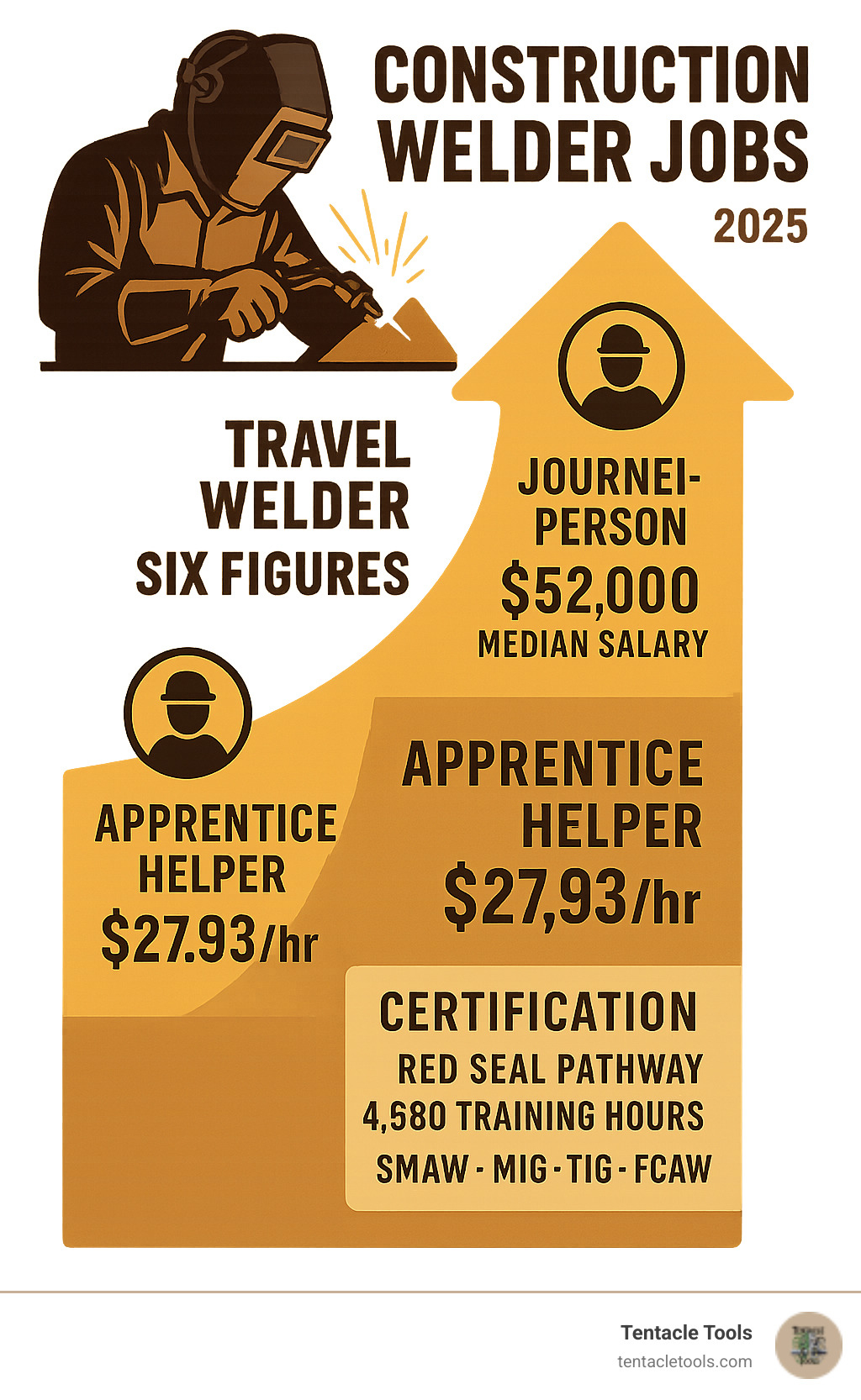
Key construction welder jobs vocabulary:
If you've ever wondered what keeps those massive construction projects standing strong, it's the skilled hands of construction welders. We're the ones who take raw metal and transform it into the backbone of skyscrapers, bridges, and industrial facilities.
Construction welder jobs involve much more than just melting metal together. Every day starts with blueprint reading - deciphering those technical drawings that tell us exactly how engineers want their vision brought to life. It's like following a recipe, except instead of baking a cake, we're building the infrastructure that powers our economy.
The heart of our work revolves around mastering multiple welding processes. SMAW (stick welding) is our bread and butter for outdoor work, while MIG welding gives us speed and clean results. TIG welding comes out when precision is everything, and FCAW (flux-cored) helps us power through thick materials with deep penetration.
But we're not just welders - we're also fabricators and problem-solvers. Metal fabrication means cutting, shaping, and fitting pieces together like a giant 3D puzzle. When equipment breaks down on site, we handle field repairs by building up worn parts with fresh metal. It's satisfying work that keeps projects moving when downtime could cost thousands.
Structural assembly is where the magic happens. We join pipes, vessels, and framework components according to engineering specs, working in every position imaginable - flat, horizontal, vertical, and the challenging overhead welds that separate the pros from the beginners.
Safety protocols aren't just paperwork to us - they're what keep us going home healthy every night. Hot-work permits, confined space procedures, and hazard recognition become second nature when you're working with temperatures that can melt steel.
The final piece of our daily routine involves precision inspections. We visually examine every weld, checking for defects and ensuring quality standards. Our reputation depends on welds that will last decades, not just pass today's inspection.
The construction welder jobs market is more diverse than most people realize. Whether you're drawn to the precision of structural work or the trip of underwater welding, there's a path that matches your interests and skill level.
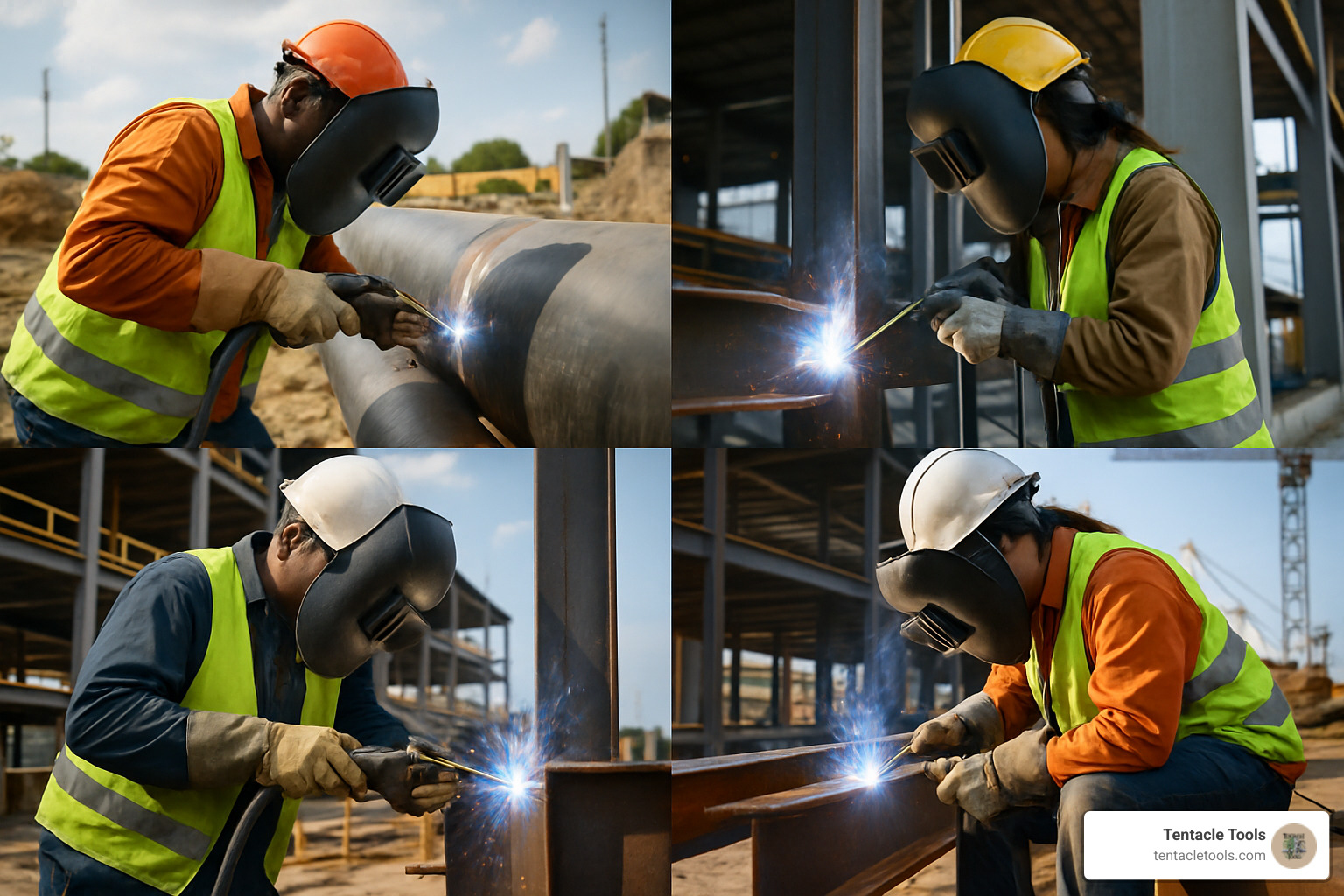
Structural welders build the backbone of our cities - high-rise buildings, bridges, and industrial facilities. These positions require precise work with heavy steel beams and demanding overhead welding positions. The satisfaction of seeing a skyline you helped create makes the physical demands worthwhile.
Pipe welders work on everything from cross-country oil pipelines to water treatment facilities. This specialty often involves travel to remote locations and offers some of the highest wages in the field. The work can be challenging, especially in confined spaces, but the pay reflects the skill required.
Fabrication welders typically work in shop environments, creating custom components and assemblies. These positions offer more predictable schedules and controlled working conditions, making them attractive for welders who prefer stability over travel.
Combo welders combine welding skills with pipe fitting, making them valuable on complex projects. These multi-skilled positions command premium wages and offer excellent job security.
Underwater welders represent the elite of the profession, working on marine construction and offshore projects. The specialized training required limits competition, but the earning potential is exceptional.
Per diem travel welders chase the big money across different job sites. These positions suit welders who enjoy new challenges and don't mind living out of a suitcase for premium compensation.
Shutdown project welders work during planned facility maintenance periods, often involving intense schedules and overtime opportunities. These short-term assignments can significantly boost annual earnings.
Apprentice welders start their journey with structured training programs that combine learning with earning. These entry-level positions provide the foundation for long-term career success.
Starting your welding career doesn't mean starting at the bottom of the pay scale. Entry-level construction welder jobs offer structured pathways that get you earning while you're learning.
The apprenticeship structure spans 4,680 hours of hands-on training spread over three 12-month periods. You'll also complete three eight-week blocks of technical training that cover everything from metallurgy to safety protocols. This comprehensive approach ensures you graduate with real-world skills employers value.
The Red Seal pathway opens doors across Canada, letting you work anywhere from coast to coast once you're certified. Starting wages begin at 60% of journeyperson rates and increase as your skills develop. More importantly, you'll have mentor support from experienced welders who remember what it was like to start out.
Apprentice programs pair you with seasoned professionals on active construction sites. You'll learn different welding processes, understand site safety, and develop the problem-solving skills that separate good welders from great ones. The best part? You're earning a paycheck while building expertise.
Entry-level welder helpers can earn up to $27.93 per hour during shutdown projects, making these positions attractive launching pads for welding careers. The structured progression ensures you develop both technical abilities and workplace knowledge that employers respect.
For experienced welders ready to maximize their earning potential, travel and shutdown work represents the pinnacle of the profession. These premium positions reward skill and dedication with compensation packages that can change your financial future.
Travel construction jobs typically offer $32 per hour base rates plus $100 per diem for meals and lodging. Many positions involve 58-hour work weeks with overtime premiums that significantly boost take-home pay. Skilled welders working these assignments regularly achieve six-figure annual incomes.
Shutdown projects create unique opportunities for overtime surge pricing during peak construction periods. These intensive assignments might last weeks or months, but the concentrated earning potential makes them attractive to welders who can handle the pace.
The compensation goes beyond hourly wages. Travel expenses, accommodation allowances, and meal stipends add substantial value to the total package. Many welders use these high-paying assignments to build savings, pay off debts, or invest in their future.
These positions often require working in remote locations and being away from home for extended periods. However, the financial rewards and professional growth opportunities make the temporary sacrifices worthwhile for many welders. The experience gained on major industrial projects also improves your resume for future opportunities.
Landing your first construction welder job doesn't have to feel overwhelming. The path is straightforward, and employers are actively seeking skilled welders who meet basic requirements.
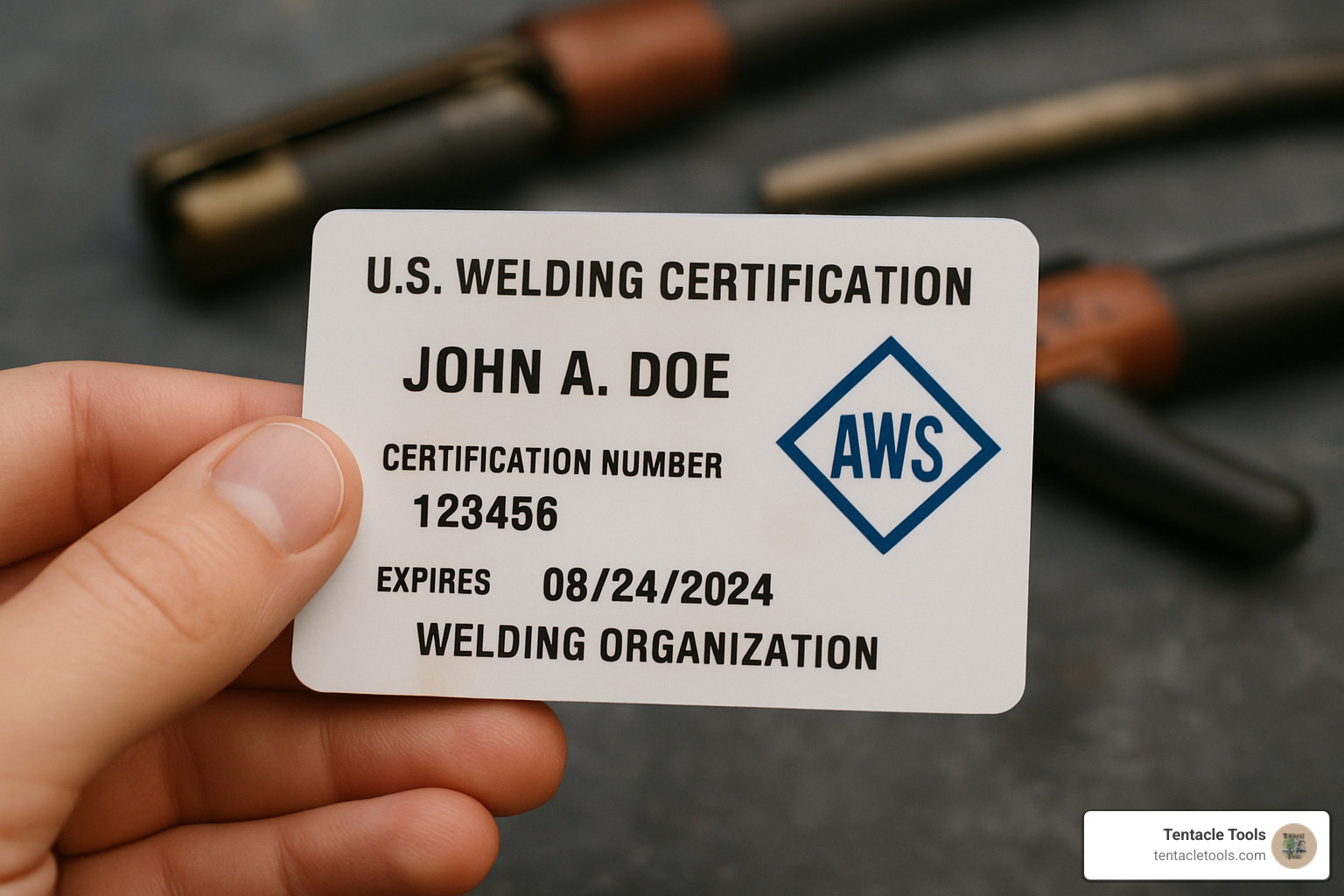
Most construction companies expect you to have a high school diploma or equivalent as your foundation. From there, you'll need either trade school completion or an apprenticeship program under your belt. These programs teach you the fundamentals of welding theory, safety protocols, and hands-on techniques.
Certification is where things get interesting. CWB (Canadian Welding Bureau) and AWS (American Welding Society) certifications carry serious weight with employers. In Alberta, certification isn't optional - it's mandatory for all welders. Other provinces treat it as voluntary, but trust me, having those credentials opens doors and increases your earning potential.
The NCCER certification specifically targets construction industry work, making it valuable for site-based positions. You'll also need to pass WPQT (Welder Performance Qualification Test) for specific welding processes, proving you can handle the techniques required for different projects.
Don't forget the basics - a valid driver's license is essential for getting to job sites and potentially transporting equipment. Many construction sites are in remote locations, so reliable transportation is non-negotiable.
The Red Seal certification deserves special attention. This interprovincial credential lets you work anywhere in Canada without requalification. If you're thinking about travel work or relocating, Red Seal certification is your ticket to mobility and better opportunities.
Technical certifications get you in the door, but personal qualities determine your success on the job site. Construction welding demands more than just knowing how to strike an arc.
Steady hands are absolutely crucial for precise welding control. You'll be working with expensive materials and critical structural components where mistakes aren't just costly - they can be dangerous. Physical stamina matters too, especially during those long days when projects are pushing deadlines.
Your eyesight needs to be sharp for detailed inspection work and spotting potential defects. Good coordination helps you manage complex positioning while operating equipment safely. Construction sites aren't forgiving environments, so physical readiness is essential.
Mental attributes are equally important. Spatial vision helps you interpret blueprints and visualize how completed work should look. You'll often work from technical drawings that require translating 2D plans into 3D reality.
Teamwork skills keep projects moving smoothly. Construction involves multiple trades working together, and welders who communicate well with electricians, pipefitters, and supervisors create better outcomes for everyone.
Problem-solving ability separates good welders from great ones. Site conditions change, materials vary, and unexpected challenges arise. Welders who can adapt and find solutions become invaluable team members.
Above all, maintain a safety mindset. Construction sites present real hazards, and welders who consistently recognize risks and follow protocols protect themselves and their coworkers. Safety-conscious welders earn respect and advance faster in their careers.
Let's talk money – because that's what really matters when you're considering construction welder jobs. The numbers are pretty encouraging, especially if you're willing to work hard and travel.
Construction welders in Canada earn a median annual salary of $52,000 working standard 40-hour weeks. That's solid middle-class income right there. But here's where it gets interesting – top earners pull in $83,200 annually when they factor in overtime and premium pay.
The real money comes from understanding the extras. Overtime premiums kick in at time-and-a-half for anything beyond 40 hours per week. Since many construction projects run tight schedules, you'll often find yourself working 50, 60, or even 70-hour weeks during peak periods.
Travel stipends add serious cash to your paycheck. Remote work means additional compensation for being away from home, plus per diem rates that can add $100 or more per day to cover meals and lodging.
Regional variations matter too. High-demand areas like the oil sands or major urban construction projects typically pay premium wages. Alberta's mandatory certification requirements often translate to higher base rates, while provinces with voluntary certification still reward certified welders with better positions.
The job market looks strong across Canada. We're seeing 666 active welder postings nationwide, with Quebec leading at 258 positions, Ontario offering 226 opportunities, and Alberta providing 43 openings. That's healthy demand in a skilled trade that's not going anywhere.
Nova Scotia, Eastern Ontario, and Northern Ontario show "Very Good" job prospects for the next six years according to government projections. This sustained demand means job security for skilled welders.
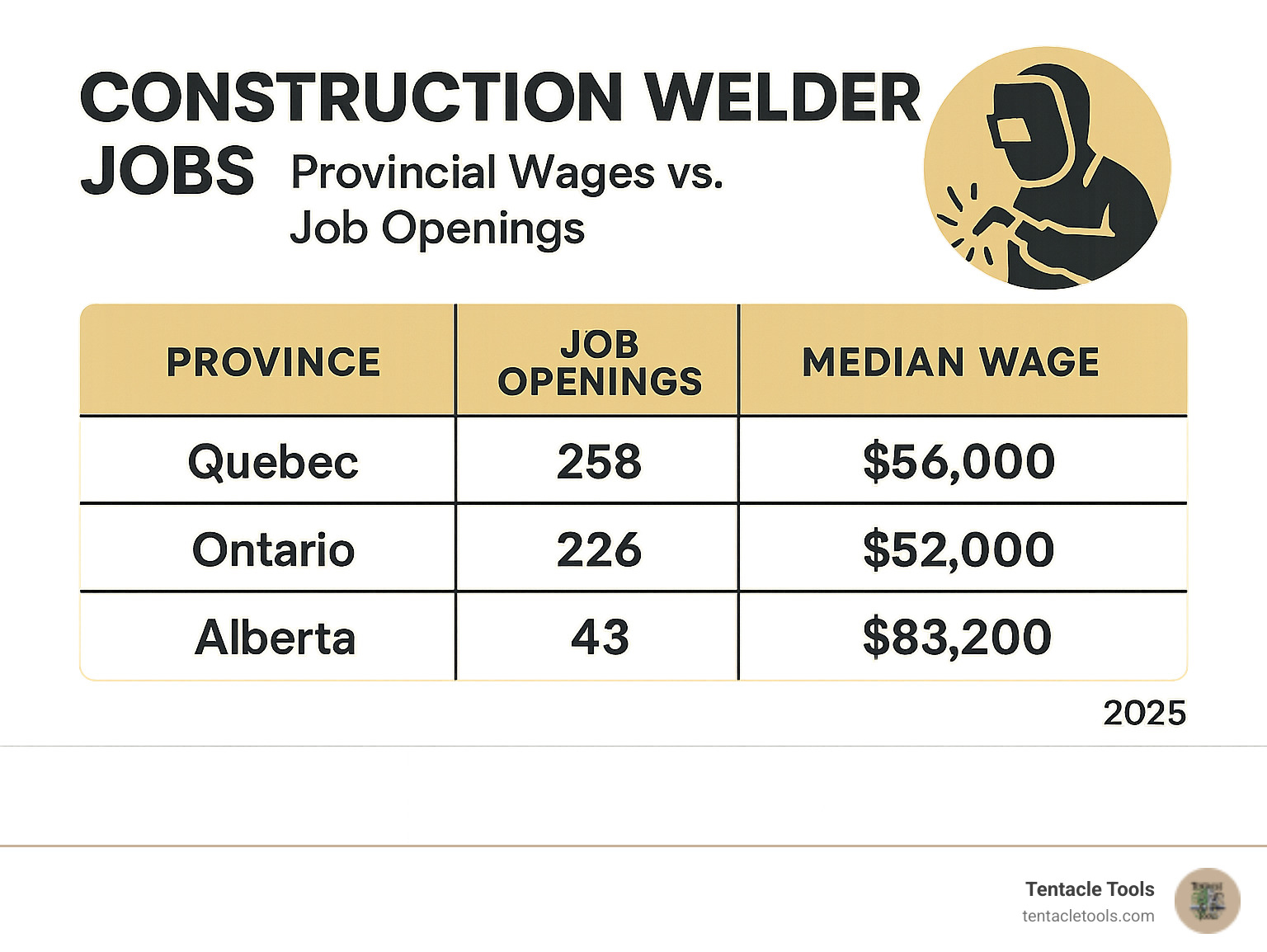
Apprenticeship wages start at approximately 60% of journeyperson rates and increase progressively as you gain experience. This means even while learning, you're earning competitive wages. Many apprentices find they can support themselves comfortably during training, especially when working on projects with overtime opportunities.
For more detailed wage information, check the Latest research on Canadian welder wages which provides updated regional data and employment projections.
The bottom line? Construction welder jobs offer solid earning potential with room for growth. Whether you're starting as an apprentice or bringing years of experience, the combination of base wages, overtime, and travel premiums can build a comfortable career.
Working construction welder jobs means adapting to challenging environments that change with every project. One day you might be welding structural beams on a high-rise in downtown Toronto, the next you could be repairing pipeline equipment in the Alberta oil sands during a February cold snap.
Most construction welders start with a 40-hour standard week, but overtime opportunities are frequent and often expected. The extra hours mean bigger paychecks, which is why many welders actually prefer the busy seasons when projects demand extended schedules.
Environmental challenges are part of the territory. You'll work in extreme temperatures - from brutal Canadian winters where your breath freezes to scorching summer heat that makes wearing full protective gear feel like being wrapped in a furnace. Confined spaces like tanks, vessels, and underground utilities require special safety protocols and additional training certifications.
Heights are common on structural projects and high-rise construction. Many welders develop a comfort with elevation that surprises their friends and family. Shift work including nights, weekends, and holidays keeps critical infrastructure projects moving forward, often with premium pay rates.

Safety equipment is your lifeline on every jobsite. Welding helmets with auto-darkening filters protect your eyes from arc flash while letting you see your work clearly. Heat-resistant gloves and protective clothing shield you from sparks and molten metal - invest in quality gear that won't let you down when it matters most.
Respirators become essential when working in enclosed areas where welding fumes can't disperse naturally. Fall protection harnesses and safety lines are mandatory on liftd work, and proper training ensures you use them correctly every time.
Hot-work permits are required before welding near flammable materials or in potentially hazardous locations. These aren't just paperwork - they're systematic safety checks that prevent accidents and save lives.
The physical demands are real but manageable with proper preparation and safety practices. Many welders work entire careers without serious injury by following established protocols and never cutting corners on safety procedures.
Your body adapts to the work over time, building the stamina and coordination that makes experienced welders so valuable. The key is maintaining constant awareness of changing site conditions and never becoming complacent about potential hazards.
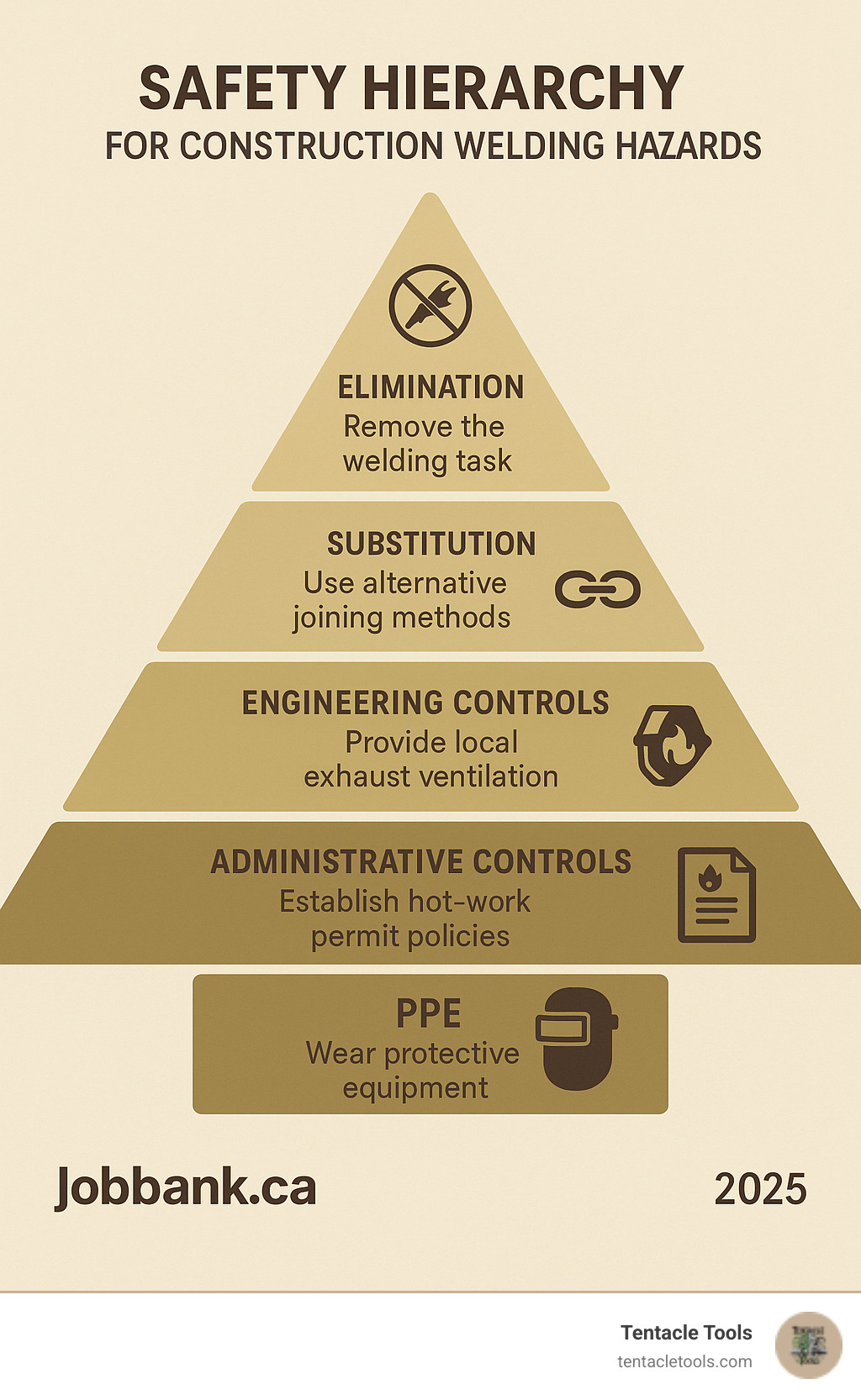
The construction welding industry is changing for the better. More women, Indigenous workers, and newcomers are joining our ranks every day, bringing fresh perspectives and skills that make our job sites stronger.
Women in welding programs are creating real opportunities. These initiatives offer mentorship, training support, and connections to employers who value diverse teams. I've worked alongside some incredibly skilled female welders who've proven that talent comes in all forms.
Indigenous inclusion programs are opening doors through targeted training and employment opportunities. Many construction companies actively partner with Indigenous communities, creating pathways from reservation to job site. These programs often include cultural support alongside technical training.
Newcomers to Canada find welding offers a solid path to middle-class stability. The skills translate across languages and cultures - a good weld is a good weld, no matter where you learned to strike an arc. Many companies provide language support and mentorship to help immigrants succeed.
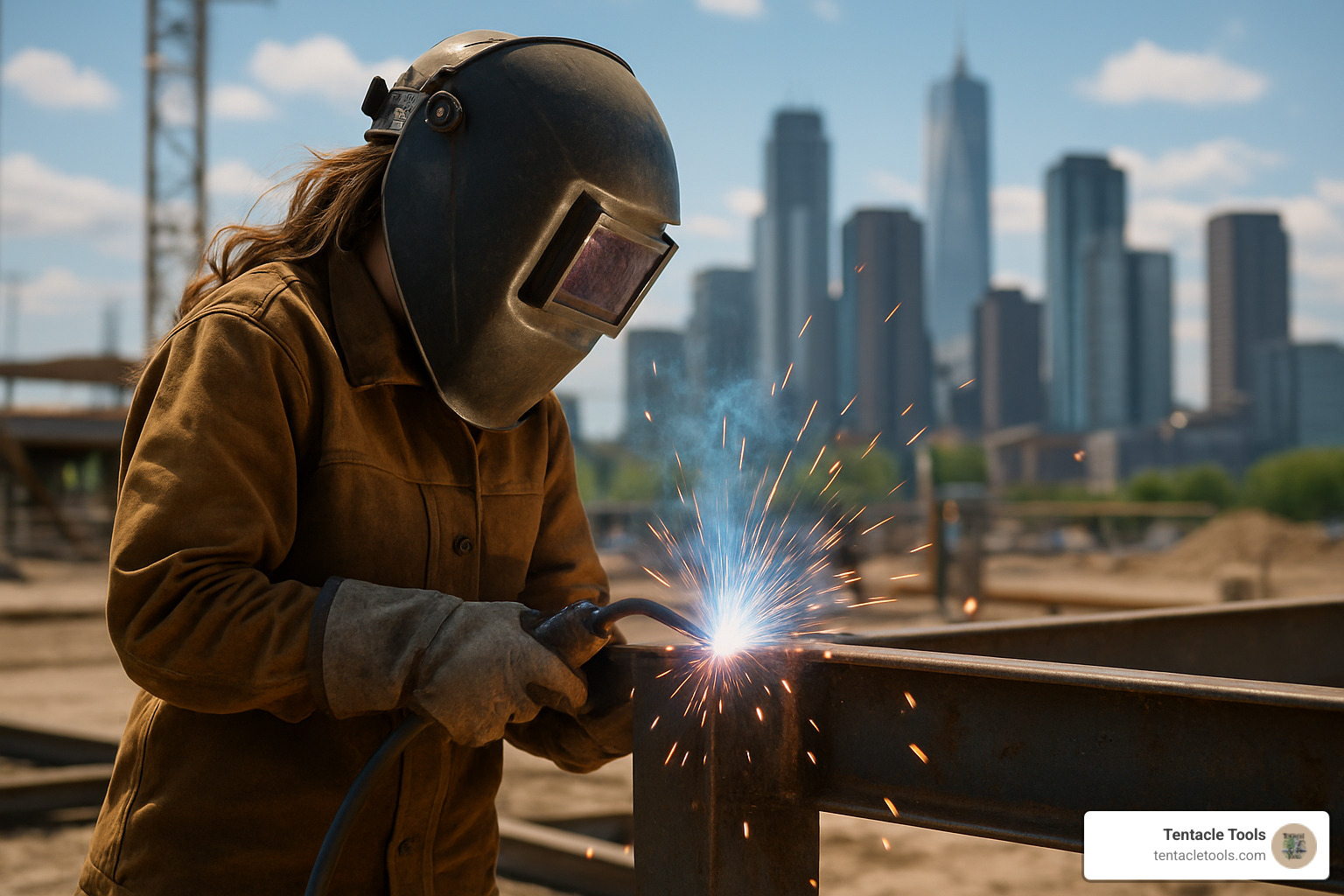
The career ladder in construction welder jobs has plenty of rungs to climb. Supervisor roles put experienced welders in charge of crews, managing quality control and training newer workers. The pay bump is significant, and you're still close to the action.
Welding inspector positions offer excellent earning potential for those who enjoy the technical side. These roles require additional certification but provide steady work ensuring code compliance on major projects. Inspectors often work regular hours with less physical demands than field welding.
Robotic programming represents the future of welding technology. Smart welders are learning to program and maintain automated systems, combining traditional skills with cutting-edge technology. This specialization commands premium wages and job security.
Continuous upskilling keeps careers moving forward. Whether it's learning new welding processes, safety certifications, or leadership skills, successful welders never stop learning. The investment in yourself always pays dividends.
Staying sharp in this trade means staying curious. The welding industry evolves constantly, with new materials, techniques, and safety standards emerging regularly.
Code updates arrive through industry publications and training sessions. Smart welders subscribe to welding magazines, attend local chapter meetings, and participate in manufacturer training programs. These updates often lead to better job opportunities and higher wages.
Online modules make learning flexible around demanding work schedules. Many certification bodies now offer distance learning options, letting you study during downtime or between projects. This accessibility removes barriers to advancement.
Trade shows provide networking gold mines. Meeting other welders, equipment manufacturers, and potential employers opens doors you didn't know existed. The connections made at these events often lead to better positions or lucrative side work.
Leadership training prepares welders for supervisory roles. Learning to manage people, read schedules, and coordinate with other trades transforms skilled welders into valuable team leaders. These soft skills often matter as much as welding ability in advancement decisions.
Professional development isn't just about moving up - it's about job security. Welders who invest in themselves stay employed during downturns and command higher wages during boom periods. The learning never stops, but neither do the opportunities.
Let me tackle the most common questions I get from welders looking to break into construction work or advance their careers.
Here's the straight answer: Alberta requires mandatory certification for all welders working in the province. It's not optional - you need those papers to work legally. But here's the thing - every other province in Canada treats certification as voluntary.
Now, before you think you can skip the paperwork, let me tell you why that's a mistake. Even where certification isn't required by law, CWB or Red Seal certification tells employers you're serious about your craft. It's the difference between getting callbacks and getting passed over.
The Red Seal certification is your golden ticket. This interprovincial standard lets you work anywhere in Canada without jumping through hoops every time you cross a border. The exam covers welding theory, safety practices, and practical applications - basically everything you need to prove you know your stuff.
The numbers you see advertised are just the starting point. Base wages run from $52,000 to $83,200 annually for regular positions, but smart welders know the real money comes from the extras.
Overtime multipliers at time-and-a-half rates can boost your take-home significantly. When you're working 58-hour weeks on shutdown projects, those extra 18 hours add up fast. Travel bonuses and per diem allowances put cash in your pocket for meals and lodging. Shutdown premiums reward you for taking on specialized, high-pressure work.
I've seen experienced welders working travel assignments pull in six figures annually. Picture this: $32/hour base rate plus $100 daily per diem, working those 58-hour weeks with overtime premiums. The math works out beautifully for welders willing to travel and work hard.
Skill premiums for advanced certifications like underwater welding or specialized processes can push your earnings even higher. The more tickets you carry, the more doors open.
The job market is hot right now, and there are several places to find opportunities. Tentacle Tools job board is specifically designed for welders and fitters - we understand what you're looking for because we've been there.
Professional recruiters who specialize in skilled trades placement know where the good jobs are hiding. They have relationships with contractors and can match you with positions that fit your skills and location preferences.
The Government Job Bank currently shows 666 active Canadian postings for welders. That's a lot of opportunity across the country, from coast to coast.
Industry associations provide member job boards and networking opportunities. Sometimes the best jobs come from who you know, not just what you know.
For immediate opportunities, Sign in for job alerts on major job platforms. Set up notifications so new construction welder jobs matching your qualifications land in your inbox automatically.
The key is casting a wide net and staying active in your search. The construction industry moves fast, and the best positions often get filled quickly.
Your journey into construction welder jobs starts with a single spark, but it can ignite a career that builds the backbone of our nation. With 666 active postings across Canada and wages reaching $83,200 annually, this isn't just about finding work - it's about joining a brotherhood of skilled craftsmen who take pride in what they create.
The path from apprentice to journeyperson demands dedication, but every hour of training and every challenging project shapes you into a professional who can work anywhere. Whether you're drawn to the steady rhythm of structural work, the trip of high-paying per diem assignments, or the precision of specialized pipeline projects, construction welding rewards those who master the craft.
Continuous learning keeps you at the top of your game. Codes change, new processes emerge, and technology evolves - but that's what makes this trade exciting. You're never done growing, never done improving. That eagle-level pride comes from knowing you've built something that will last generations.
At Tentacle Tools, we've walked in your boots. Our American-made tools are engineered by welders who understand the demands of construction sites, the frustration of equipment failure, and the satisfaction of a perfect weld. We're proud to support the skilled trades community not just with quality equipment, but with opportunities through our dedicated job board.
The construction welding field needs professionals who accept hard work, maintain safety standards, and take pride in their craft. If you're ready to build a career that combines technical skill with solid pay and job security, construction welder jobs offer the foundation for long-term success.
Ready to strike that first arc toward your future? The construction industry needs welders who can rise to the challenge - and Tentacle Tools empowers you to succeed every step of the way.
Explore insights, tips, and trends in tech and productivity!